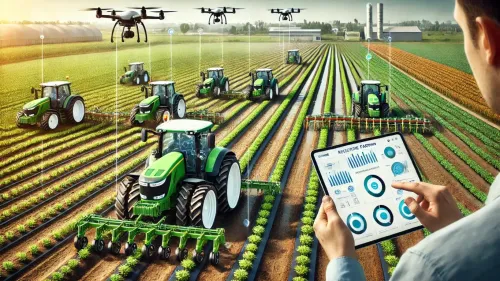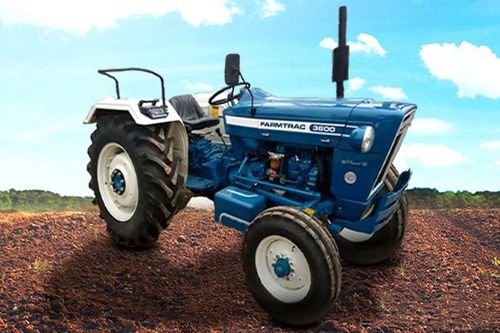Ad
Ad
Maximizing Harvest: Essential Tips for Effective Land Preparation in Farming

Land preparation is a critical step in the farming process that significantly influences crop yield and overall crop harvesting. Properly preparing the land sets the stage for healthy plant growth and maximizes the efficiency of farming operations. Land preparation is a key factor in ensuring successful crop growth.
Land preparation is the foundation of successful farming, essential for boosting optimal crop growth and a good harvest. In this article, we have discussed the major steps and tips of land preparation to support rich crops.
Major Steps and Tips of Land Preparation to Support Rich Crops
Here are key steps and tips to ensure your land is ready to support thriving crops:
Soil Testing
Before starting any land preparation, test the soil thoroughly. A soil test provides valuable information about the soil's nutrient levels, pH, and texture.
Understanding your soil composition helps you make informed decisions about fertilizer application and other soil amendments, ensuring optimal conditions for plant growth. This helps create an optimal environment for plant growth.
Also Read: Wheat Farming: Process and Best Tractors for Wheat Farming
Clearing and Cleaning
Clear the land of debris, weeds, and unwanted vegetation. This initial step eliminates competition for nutrients and reduces the risk of pests and diseases, setting the stage for a healthy crop.
Clearing the land of unwanted materials creates a clean ground for planting and prevents potential obstacles during cultivation and harvesting. This step is particularly important for reducing competition for nutrients and water.
Ploughing and Tilling
Ploughing and tilling are fundamental land preparation techniques that help break up compacted soil, improve aeration, and facilitate better water infiltration. The depth and intensity of ploughing depend on the crop type and soil conditions.
However, it's essential not to over-till, as this can lead to soil erosion and nutrient loss. This enhances soil aeration, allowing roots to access nutrients. Timing is crucial and perform these activities when soil moisture is just right to prevent compaction.
Adding Organic Matter
Adding organic matter, such as compost or well-rotted manure, enhances soil structure and fertility. Organic matter improves water retention, promotes beneficial microbial activity, and provides essential nutrients to plants. Mix organic matter into the soil during the tillage process to ensure uniform distribution.
Levelling the Land
Levelling the land is crucial for uniform water distribution and proper irrigation. Uneven surfaces can lead to water pooling in some areas and insufficient moisture in others. Use levelling equipment to create a flat and well-drained field, optimizing water efficiency and preventing waterlogged conditions that can harm plant roots.
Implementing Conservation Practices
Consider incorporating conservation practices such as contour ploughing, terracing, or cover cropping. These techniques help prevent soil erosion, retain moisture, and improve overall soil health. Conservation practices contribute to sustainable farming by preserving the integrity of the land and reducing the environmental impact of agriculture.
Timing is Key
Timing is crucial in land preparation. Start the process well in advance of the planting season to allow the soil to settle and stabilize. Avoid working on wet soil, as this can lead to compaction and negatively impact soil structure. Consider local climate patterns and seasonal variations when planning your land preparation activities.
Choosing the Right Equipment
Selecting the appropriate equipment for land preparation is essential for efficiency and effectiveness. The choice of ploughs, tillers, and other implements should align with the scale of your operation and the specific needs of your crops. Well-maintained equipment ensures that tasks are completed accurately and minimizes the risk of breakdowns.
Proper Bed Preparation
Form raised beds or ridges to improve drainage, preventing waterlogging, especially in rainy areas. Well-leveled and shaped beds ensure uniform water distribution, creating an ideal planting condition and making weed control easier.
Appropriate Fertilization
Based on soil test results, apply fertilizers carefully to meet specific crop needs. Use a mix of organic and inorganic fertilizers for a balanced nutrient supply. Avoid over-fertilization to prevent environmental issues.
Mulching
Apply mulch to the soil surface for multiple benefits. Mulch retains soil moisture, suppresses weeds, regulates soil temperature, and prevents erosion. Organic mulches contribute to gradual soil improvement as they decompose, promoting overall soil quality.
Irrigation Planning
Plan irrigation based on crop water requirements, local climate conditions, and soil water-holding capacity. Use efficient methods like drip irrigation to ensure water reaches the roots where it's needed most, optimizing water management.
Regular Monitoring
Monitor crops during the growing season to identify and address issues promptly. Detect and resolve diseases, nutrient deficiencies, water stress, or pests through regular monitoring. Implement corrective measures before problems escalate for a successful harvest.
Also Read: Why Are Tractors So Expensive In India?
Conclusion
Effective land preparation is a foundational step in successful farming. By following these essential tips, farmers can create an optimal environment for plant growth, maximize crop yield, and contribute to sustainable agricultural practices.
Investing time and effort in land preparation pays off in the long run, as a result, it will give you good harvests and a thriving agricultural enterprise.
Features & Articles
Top 5 John Deere Tractors in India 2025: Full Comparison of Features, Performance, and Pricing
Explore top 5 John Deere tractors in 2025 with features, performance, prices, and full comparison for Indian farmers....
19-Jun-25 12:11 PM
Read Full NewsTop 5 Swaraj Tractors for Indian Farmers in 2025
Explore the top 5 Swaraj tractors in India, offering power, durability, and performance for every type of Indian farmer....
02-Jun-25 10:06 AM
Read Full NewsThinking of Buying a Second Hand Tractor? Read These Top 10 Important Tips
Explore key tips to inspect the engine, tyres, brakes, and more before buying a second hand tractor in India....
14-Apr-25 08:54 AM
Read Full NewsComprehensive Guide to Tractor Transmission System: Types, Functions, and Future Innovations
Learn about tractor transmission types, components, functions, and selection factors to enhance efficiency, performance, and agricultural productivity....
12-Mar-25 09:14 AM
Read Full NewsModern Tractors and Precision Farming: Transforming Agriculture for Sustainability
Precision farming enhances agriculture by integrating GPS, AI, and modern tractors for sustainable, efficient, and productive farming practices in India....
05-Feb-25 11:57 AM
Read Full NewsTop 10 Tractors Under 30 HP in India 2025: Guide
Top 10 tractors under 30 HP in India offer efficiency, affordability, and power, ideal for small farms with diverse agricultural needs....
03-Feb-25 01:17 PM
Read Full NewsAd
Ad
As featured on:


Registered Office Address
Delente Technologies Pvt. Ltd.
M3M Cosmopolitan, 12th Cosmopolitan,
Golf Course Ext Rd, Sector 66, Gurugram, Haryana
pincode - 122002




















